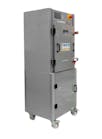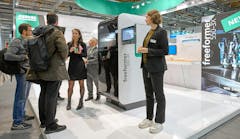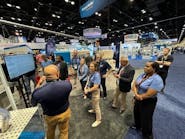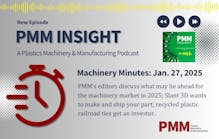
Glenn Woodcock was retired for less than a year when he decided that his second act lay in starting and running his own company. That ambition became a reality in February 2000,
with the formation of PSI-Polymer Systems Inc., Conover, N.C., a supplier of screen changers, extrusion gear pumps and static mixers. As it turns out, Woodcock, 65, who says he cut his teeth on "gear pumps, polymers and processes," began his new venture armed with a wealth of technical know-how gained from decades of experience in the extrusion industry.
An engineer by training, he also has a manufacturing background. He became involved with the plastics industry in the early 1980s, when he went to work for Zenith Pumps, where he managed a facility contracted to repair and rebuild the gear pumps and metering pumps used in DuPont's plastics and textile manufacturing businesses. "I got a very broad perspective of many polymers, lots of processes," he says. In addition to repairs, the facility made improvements on the designs of pumps that were failing prematurely. At the time, Zenith handled a huge volume of equipment, which he estimates at 6,000 to 7,000 pumps a month. "You get a quick understanding of what's going on with that kind of magnitude," he says.
The experience stuck with him, and he says that his company's focus is squarely on customers' needs and fine-tuning his products to solve their problems. He recently spoke with Plastics Machinery Magazine's senior correspondent John DeGaspari.
Tell us about how PSI-Polymer Systems got its start.
Woodcock: I retired in December 1999 as vice president of operations/engineering at Dynisco Extrusion, a division of Dynisco Instruments Inc. I had planned to pursue a lifetime dream of playing golf on the Senior PGA Tour. I learned quickly that my golf game was not good enough and my dream was not going to become reality! It did not take long for me to get bored in retirement; I always wanted to own my own business and felt that there were needs to fulfill in the plastics industry.
Was there a "eureka" or "aha" moment when you identified your product niche or business model?
Woodcock: In my previous experience in the plastics extrusion industry, I felt there was a need for businesses [focused on] systems, repairs and process solutions. We came up with the PSI-Polymer Systems name centered around the fact that I thought it was important to have the word "Systems" in our name as a message to customers and the industry that we had a lot more to offer than just components and equipment. It was my opinion that the pump/filter competitors felt our products were commodity items and really did not focus on the customer's needs to fine-tune their process, applications and/or solve problems they had, in addition to providing a turnkey system package customized to meet their needs and space constraints.
What business was your father in? Did that influence your career choice?
Woodcock: My father was a truck driver. It certainly influenced me to pursue an education and have a career in something I enjoyed doing. I have a mechanical technology engineering degree from St. Louis Community College and took additional classes at University of Missouri. My first job was a design engineer for Wagner Electric in the automotive industry.
What was your background in plastics?
Woodcock: I worked 10 years for Zenith Pumps as plant manager for the dedicated repair facility for DuPont. I later became operations manager for Zenith Pumps' three facilities. After Zenith Pumps, I worked 10 years for Normag Corp. [subsequently Dynisco Extrusion] as vice president of operations/engineering. In working for these companies, I received a broad education in the processes, applications and customers' needs in the industry. I worked on several patents while employed at these companies.
Early on, you brought in two industry veterans — Steve Fox, founder and president of Normag Corp., and Bart Jones, founder and president of Extek Corp. — as business associates. How did you know Fox and Jones?
Woodcock: Both Steve and Bart are major contributors to our organization. Steve and Bart are not only colleagues, but friends first. I have known both of them for over 20 years. Steve hired me at Normag, and I met Bart when working for Dynisco through the acquisition of Extek, his previous company. Steve and Bart were previous business owners and were mentors to me, not only when starting PSI, but also as we continue to grow.
Are family members involved with PSI? How important is being a family business to PSI's success?
Woodcock: My wife, Carla, and two sons, Glenn Jr. and David, are employed at PSI. My wife oversees administration, finance and human resources. David is engineering manager and Glenn Jr. is operations manager. David and Glenn Jr. both work for Don Macnamara, our general manager. They are good guys and are very knowledgeable about what they do. I feel that a family business is important for our customers. We are not interested in selling out to a large corporation, like most of our competitors have, and [so] we can provide a stable and long-term relationship with customers. Family was also important in the early days, as we, as a family, worked 80-plus hours a week to make our business successful.
How does PSI set itself apart from competitors in a competitive industry?
Woodcock: We strive to provide a total process solution for our customers, along with providing superior customer service. We pride ourselves that we can do a full-service, turnkey solution and rapid response to any customer's needs. This not only is for our equipment, but any competitor's equipment they may have. Service was one of the foundational elements of the company. A sign hangs in the building that all see and read every day: "Do what you promise you will do." We live by this.
How does PSI develop new products? Do you have engineers dedicated to product development?
Woodcock: PSI has a dedicated engineering department that is also tasked with new product design and development. Development comes from observation, listening to problems or opportunities that are brought to us, ideas that we generate internally and sometimes, simple common sense. We do not have to work through corporate layers to approve new designs.
A great example is our die changer, introduced at the last NPE. This came from a foamed sheet processor seeking to reduce downtime from over an hour to less than 10 minutes, which was the window they could work with before having to shut down and purge the extruder. I didn't need a market study or ask how many machines the sales team would sell every year. We saw an opportunity to serve this processor and to establish a relationship with them based on value. It was a home run, and we now have another great product in the portfolio that brings new value to foamed sheet producers.
What other examples can you provide?
Woodcock: In filtration, a lot of people are worried about degradation, gels and residence time. We have an oval, in-line filter specifically for twin-screws, which matches twin-screw extruder barrel configurations, eliminating divergent material flow transitions and stagnant flow areas. Another example of the things we do is specialty pumps for the crosslinked polyethylene industry. We have developed special gear pumps to control this process and make very high-quality gauge of the crosslinked material.
What are your most successful products?
Woodcock: It's probably a combination between our gear pumps and knowing and understanding the application and process. It seems like a lot of our competitors are in the parts business. We are in the equipment business. When we design and make equipment to a customer's needs, we expect it to be out there 20, 30, 40 years. We don't have any designed obsolescence.
Do you manufacture everything in the U.S.? Have you considered outsourcing some manufacturing to other countries?
Woodcock: We feel that it's critical to keep our manufacturing in the U.S.A. The fit and finish of our parts require precision machining and stringent quality control. In the early days of PSI, we tried to outsource some components to another country. The quality that we received on these parts was not up to PSI's standards; therefore, we made the decision to commit to vendors located in the U.S.A. and keep it here. We feel that this is also important to most of our customers, including international customers. The other end of this is a personal satisfaction in keeping jobs here in America.
What is the best business decision you ever made? What was the worst?
Woodcock: Best business decision: starting PSI and maintaining the commitment to keeping it in the family and not selling out. Worst business decision: allowing a customer with a large order to convince me to change from an industry-standard PLC control to an off-brand, non-industry-standard PLC control. There were 26 turnkey systems involved, located all over the U.S.A. and when there was a glitch in the hardware involved in the PLC, PSI had to solve the problem for the off-brand manufacturer. Needless to say, it was a nightmare!
How would you like to be remembered, either personally or as a businessman?
Woodcock: As someone who brought value to our industry and to the lives of the people who make up PSI. We want to leave our industry a better place than it would've been without us. To do this, we work to solve problems, do what we say we will do and contribute to the success of our customers.
I could have stayed retired and could do so if I choose, but I have a passion for our products and I'm surrounded by talented people of similar mindset. We challenge each other and feel one another's passions every day. That is very hard to give up. I would like to be remembered as someone who built something very special. If I have a legacy, it will be in the continued growth and health of PSI and the lives of the people that make the company thrive.
John DeGaspari, senior correspondent







